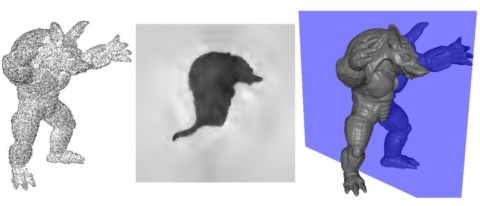Poisson surface reconstruction

(SGP 2021 Test of Time Award.)
One perceived weakness of this work is that it requires oriented normals at the input points. However, most scanning technologies provide this information, either from line-of-sight knowledge or from adjacent nearby points in a range image. Experiments in [Kazhdan 2005] show that the approach is quite resilient to inaccuracies in the directions of the normals. In our subsequent SGP 2007 paper, we show that the Poisson problem can be solved out-of-core for large models by introducing a multilevel streaming representation of the sparse octree. Our 2013 paper extends the approach for improved geometric fidelity and using a faster hierarchical solver.
The algorithm has been incorporated into MeshLab and VTK, and adapted over tetrahedral grids in CGAL.
In 2011, Michael Kazhdan and Matthew Bolitho received the inaugural SGP Software Award for releasing the library code associated with this work.
And ten years later at SGP 2021, the paper received the inaugural Test of Time Award.